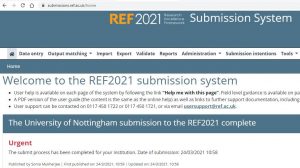
March 31, 2021, by Rob Ounsworth
REF2021: heartfelt thanks and congratulations to all involved
Professor Dame Jessica Corner’s praise for REF team
Our REF2021 submission is complete, and was in fact was submitted to Research England a week ahead of today’s deadline. My heartfelt thanks and congratulations to every one of the hundreds of colleagues involved.
The Research Excellence Framework is a key indicator of the quality of our research and its impact. It captures how we do research and build partnerships, and how our research culture and infrastructure supports our mission of delivering world-class discoveries that change lives.
REF rewards excellence and is our principal source of research funding from the UK Government, worth around £50m a year to the university until the next assessment exercise in six or so years. It has a key influence on our international reputation and profile.
Our 2021 submission features 4,249 research outputs and enormous amounts of data, bringing together the work of 1,804 academics (in turn supported by teams of researchers), and includes 135 case studies further evidencing the impact of our research on communities in the UK and across the world. Our REF environment statements meanwhile demonstrate how our people, infrastructure and culture enable and support the delivery of world-class research and impact, from school and department through to institutional levels.
Over a number of years, REF2021 has demanded the unwavering attention of many hundreds of academic and support staff drawn from every nook and cranny of the university.
When a few members of the REF2021 team gathered as REF and Research Policy Manager Soma Mukherjee hit ‘Submit’, they no doubt felt relief, satisfaction and not a little pride as our completed Research Excellence Framework submission was made to Research England.
Hit send: the university’s REF2021 submission to Research England
Professor Neil Crout, Academic Lead for REF, says this monumental exercise “has been a properly weird experience, simultaneously important, ridiculous, maddening and oddly enjoyable”.
The scale of the work led by Soma, Neil, Academic Lead for REF Environment Professor Lynda Pratt, together with REF Impact Manager Chris Mellor, REF Environment and Outputs Officer Athina Meletiou, Outputs Co-Ordinator Kirsty Hatton and REF Systems Coordinator Rae Larder, is truly impressive.
The final 4,249 research outputs were drawn from 13,439 internally assessed outputs, themselves drawn from pool of 30,750.
The 29 units of assessment, from Classics and Archaelogy to Clinical Medicine, from Biosciences to Business, Politics to Primary Care, reflect the scope and ambition of the university’s research portfolio. Each UoA submitted impact case study narratives (that’s 675 pages of narrative and 2.4GB of data).
All this weighty data serves to evidence the quality of our research and its impact on the world, and within the REF2021 submission are stories of some truly exciting and exceptional discoveries by dedicated teams of people.
Our 29 Unit Environment Statements and 1 Institutional Level Statement run to around 318,000 words – a little over half of War and Peace.
Professor Lynda Pratt says: “REF environment involves putting lots and lots of the great things that enable us to do first-class research and impact into the very small space that the REF guidelines allow us: people, equipment, funding, infrastructure support, partnerships and numerous other resources.
“It also captures something intrinsic but slightly less quantifiable – our great research culture.
“Every element of our environment submission shows that research culture in practice. It is there in the actual material, data and narratives that make up individual environment documents. It is also embodied in all the collaboration, dedication, hard-work, talent, support and sheer good will that went into crafting, evidencing, and revising those individual environment statements. I’d like to say a very, very big thank you to everyone involved for their amazing work on REF environment. It has been a huge pleasure and privilege to work with you.”
Soma Mukherjee, REF and Research Policy Manager, had responsibility for strategic and operational management and coordination of REF2021.
She says: “REF is a huge undertaking and at the heart of our submission lies the tremendous hard work and effort of every member of the central REF team and of the coordinators and other support staff across the university – a truly holistic approach was taken to deliver REF2021. Behind every research output, environment statement or case study lies reviews, data upload to system, analysis of data to be submitted, continuous checking and rechecking of every bit of the final submission, continuous communication, developing and implementing policies and processes and above all rigorous planning. The tireless dedication and forensic attention to detail of colleagues who pulled together all the pieces of this complex jigsaw is remarkable. I wish we had the space here to thank all of you in person, but rest assured, I treasure all of your contributions.”
For Professor Crout, a former head of the School of Biosciences, his role has given insights into the breadth and depth of research at Nottingham. “As a scientist, it’s fascinating to talk to people from theology to clinical medicine and everything in between.”
Neil worked closely with Chris Mellor, who took up the post of the university’s REF Impact Manager after a clean sweep of REF2014 4* impact case study successes with the School of Pharmacy..
“I tell everyone I have the most interesting job at the university.
I get to hear about all the amazing research that is having
an impact on society in so many different ways.”
REF Impact Manager Dr Chris Mellor
Chris worked with academic authors and a network of impact officers to ensure all 135 case studies (whittled down from 300) had a compelling narrative and strong evidence, with the goal of ensuring as many as possible achieve the maximum 4* rating for excellence. In a blog reflecting on her REF experience, Chris is reluctant to single out any favourite impact case studies (but you can find some fascinating case studies in the Vision: our research impact section of our website).
Panels of expert assessors will now examine the University’s REF2021 submission later this year, with the outcome announced in spring 2022.
Among the thousands of familiar academic outputs of journal articles and publications digitally submitted, some 340 physical outputs are being sent to Research England. The assessors will even peruse the music and libretto of an opera, Losing Her Voice, composed by Dr Elizabeth Kelly of the Department of Music and performed at Lakeside Arts. A collaboration with the Mixed Reality Lab allowed audiences to interact with the performance through a specially designed app.
“This has been a massive and remarkable collective effort,
involving hundreds and hundreds of people.
My heartfelt thanks to each and every one of you for all your hard work,
perseverance, intelligence and professionalism.”
Academic Lead for REF Professor Neil Crout
This is the most ambitious picture of our research and its impact and of our research environment ever undertaken. REF will inform the value of our quality-related (QR) funding, which goes to schools and faculties. It benchmarks our progress and supports our ambition is to be further recognised as an institution that delivers research of true global significance. It also evidences our commitment to a diverse, sustainable and rich research culture.
I am confident that the teamwork, amazing dedication and goodwill of all involved in delivering our REF2021 submission will inform how we work together to empower and support each other in the future.
We also delivered this exceptional work in exceptionally challenging times. My thanks once again to all involved in REF2021.
Professor Dame Jessica Corner
Pro-Vice-Chancellor for Research and Knowledge Exchange
No comments yet, fill out a comment to be the first




Leave a Reply